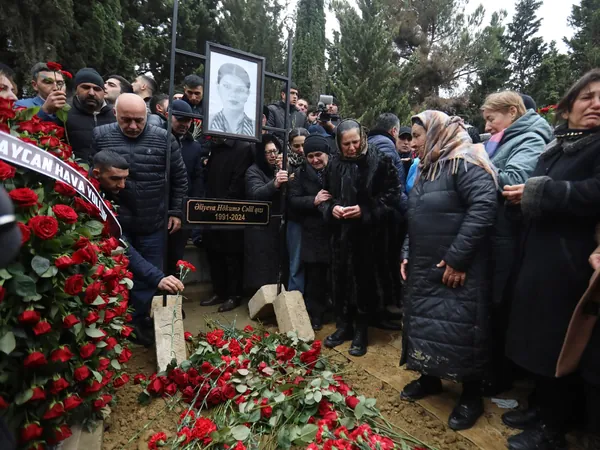
After Tragedy Strikes: Azerbaijan's Anger Towards Russia Following Devastating Plane Crash
2025-01-01
Author: Ming
A National Mourning and Political Friction
In a week of national mourning, Azerbaijan is grappling with the tragic aftermath of the Christmas Day plane crash that killed 38 individuals. The incident has not only opened wounds from the recent past but stirred political grievances between Azerbaijan and Russia.
Political scientist Farhad Mammadov of the Baku-based Center for Studies of the South Caucasus recalls a more accepting time in November 2020, when Azerbaijan downed a Russian helicopter during the conflict over Nagorno-Karabakh. In that instance, Azerbaijani President Ilham Aliyev took immediate responsibility, apologizing to Russia and ensuring compensation for the affected families. Fast forward four years, and the tables have turned dramatically.
The Plane Crash Incident
On December 25, Azerbaijan Airlines Flight 8243, with 67 souls on board, took off from Baku to Grozny, Chechnya. A shocking turn of events occurred when the aircraft reportedly came under fire as it approached the Russian airspace, resulting in a crash near Aktau, Kazakhstan. Only 29 of those aboard survived.
Initially, Russian officials speculated various causes for the crash, including a possible collision with a flock of birds or an onboard explosion. However, evidence suggests the plane may have been hit by surface-to-air missiles from Russian air defense. President Putin made an apology for the "tragic incident," yet stopped short of accepting any formal responsibility, instead implying that Ukrainian drones were operating in the area.
Public Outcry and Accountability
Azerbaijan's immediate response was one of outrage and disbelief. President Aliyev has since demanded that Russia take full accountability and provide reparations for the victims’ families, reflecting a deep-seated anger over what is perceived as negligence and mismanagement on Russia's part in addressing this crisis. Mammadov emphasizes that Azerbaijan is expecting a level of accountability equivalent to what they demonstrated in 2020.
Adding to the outrage is the allegation that the aircraft's pilots were denied emergency landing permission in Russia, which could have potentially saved lives. A Baku local, Leyla, expressed her frustration, stating, "This lack of humanity and accountability is what angers and devastates people the most." Many Azerbaijanis feel the handling of the situation by Russian authorities has added profound grief to an already devastating loss.
Political Ramifications
The political ramifications of this tragedy could be far-reaching. Azerbaijan's relationship with Russia has historically been complex. While they share a long-standing partnership, rooted partly in geography and commerce, this incident tests the fabric of their interactions. Azerbaijan’s independence following the collapse of the Soviet Union and its conflict with Armenia over Nagorno-Karabakh strained relations at times, but Azerbaijan has maintained a degree of neutrality, particularly regarding Russia’s actions in Ukraine.
Despite fluctuating dynamics, trade remains a significant aspect of their relationship. Prior to the incident, Azerbaijan was gearing up to increase its trade and economic ties with Russia — with many Azerbaijani flights operating in and out of Russian territory. Both nations benefit economically from their partnership, making it imperative for them to manage this crisis carefully.
Looking Ahead
Political analyst Rasim Musabeyov stresses that it now falls on President Putin to restore the faltering ties through sincere actions: "Putin's apology should be followed by an analysis of this incident, the culprit punished, and compensation paid," he advocates.
Azerbaijan does not wish to escalate tensions with Moscow; instead, it seeks a resolution that respects the lives lost and acknowledges the tragedy faced by the families of the victims. As this story unfolds, the expectations of the Azerbaijani people of what constitutes accountability from their powerful neighbor remain high, potentially setting the stage for a pivotal shift in relations between the two nations.
 Brasil (PT)
Brasil (PT)
 Canada (EN)
Canada (EN)
 Chile (ES)
Chile (ES)
 Česko (CS)
Česko (CS)
 대한민국 (KO)
대한민국 (KO)
 España (ES)
España (ES)
 France (FR)
France (FR)
 Hong Kong (EN)
Hong Kong (EN)
 Italia (IT)
Italia (IT)
 日本 (JA)
日本 (JA)
 Magyarország (HU)
Magyarország (HU)
 Norge (NO)
Norge (NO)
 Polska (PL)
Polska (PL)
 Schweiz (DE)
Schweiz (DE)
 Singapore (EN)
Singapore (EN)
 Sverige (SV)
Sverige (SV)
 Suomi (FI)
Suomi (FI)
 Türkiye (TR)
Türkiye (TR)
 الإمارات العربية المتحدة (AR)
الإمارات العربية المتحدة (AR)